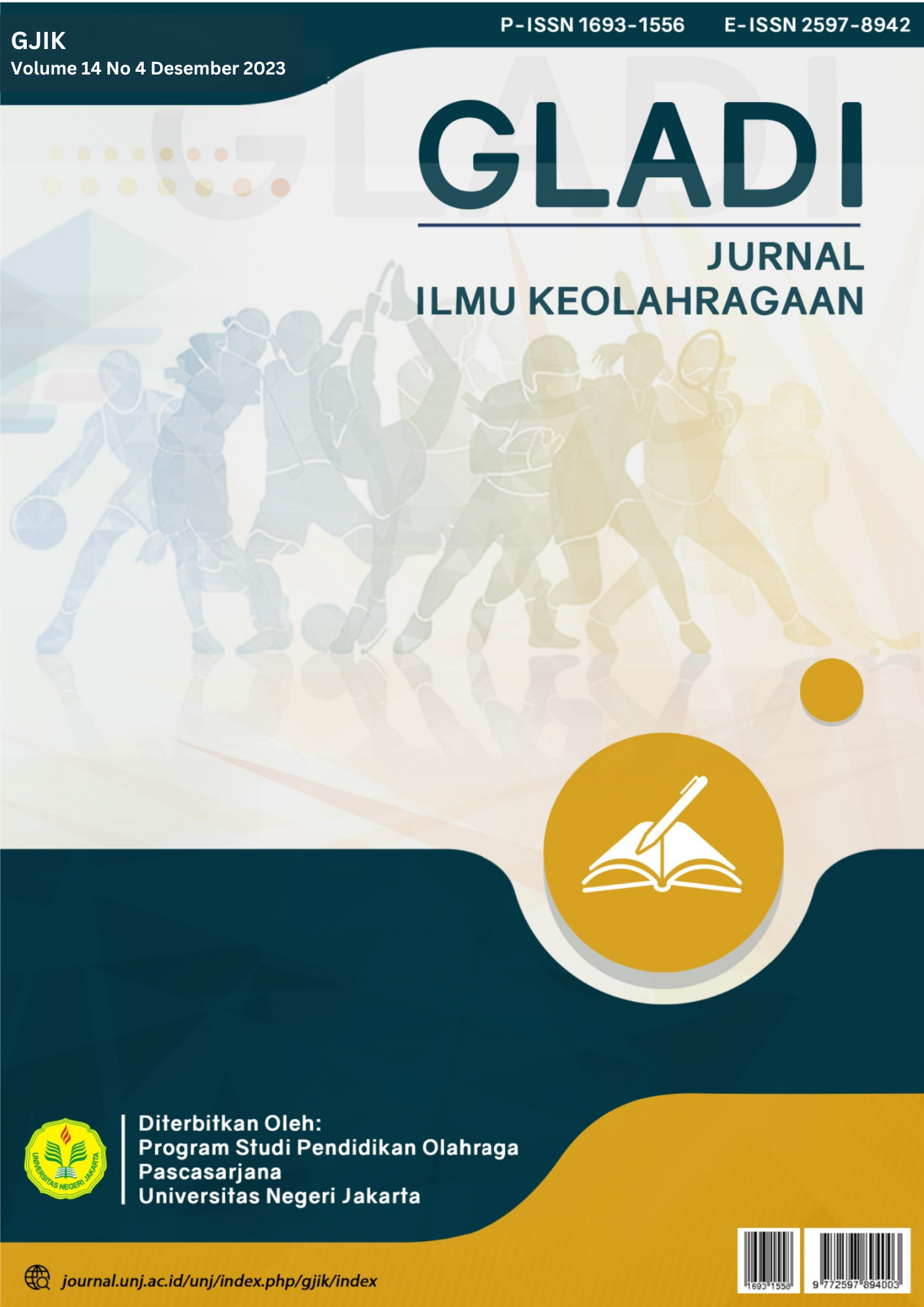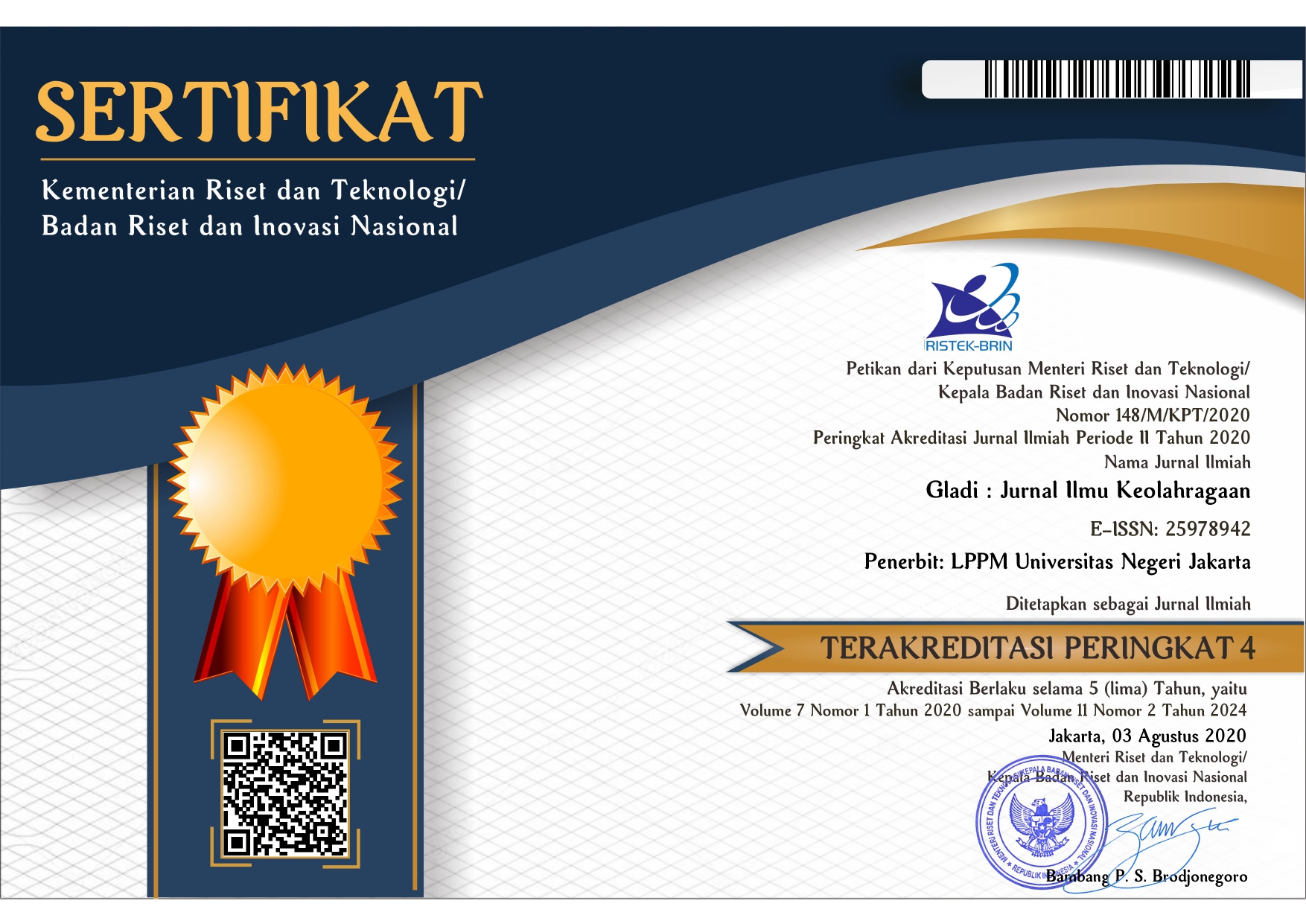THE EFFECT OF TRAINING ON MUSCLE MASS DEVELOPMENT IN KONI DKI JAKARTA WUSHU ATHLETES
DOI:
https://doi.org/10.21009/GJIK.144.05Keywords:
-Body composition, Muscle mass, Training program, WushuAbstract
ABSTRACT Muscle mass is a part of body composition that is important for athletes’ health and performance, especially Wushu athletes. An optimal training program can increase athlete’s muscle mass, so it is necessary to evaluate muscle mass changing before and after the exercise program. The purpose of this program is to determine the effect of training on muscle mass development in PELATDA KONI DKI Jakarta Wushu athletes.
Anthropometric and body composition examinations (muscle mass, skeletal muscle, and segmental muscle mass) were carried out before and after the exercise program. Examinations were carried out in June and September 2023. 20 of the 22 Wushu athletes took part in anthropometric and body composition examinations. Data was analyzed using the Paired Sample T test. Results showed that there was no significant difference between muscle mass, skeletal muscle and segmental muscle mass before and after the exercise program with >0.05 p value. Our findings show that the training program is less effective in increasing Wushu athletes’ muscle mass. Further research needs to be carried out to examine training programs and other supporting factors such as nutrition and recovery in increasing athletes’ muscle mass.
Downloads
References
Campa, F., Toselli, S., Mazzilli, M., Gobbo, L. A., & Coratella, G. (2021). Assessment of body composition in athletes: A narrative review of available methods with special reference to quantitative and qualitative bioimpedance analysis. In Nutrients (Vol. 13, Issue 5). https://doi.org/10.3390/nu13051620
Dewi, R. C., Rimawati, N., & Purbodjati. (2021). Body mass index, physical activity, and physical fitness of adolescence. Journal of Public Health Research, 10(2). https://doi.org/10.4081/jphr.2021.2230
Fuchs, C. J., Kouw, I. W. K., Churchward-Venne, T. A., Smeets, J. S. J., Senden, J. M., van Marken Lichtenbelt, W. D., Verdijk, L. B., & van Loon, L. J. C. (2020). Postexercise cooling impairs muscle protein synthesis rates in recreational athletes. Journal of Physiology, 598(4). https://doi.org/10.1113/JP278996
Hetherington-Rauth, M., Leu, C. G., Júdice, P. B., Correia, I. R., Magalhães, J. P., & Sardinha, L. B. (2021). Whole body and regional phase angle as indicators of muscular performance in athletes. European Journal of Sport Science, 21(12). https://doi.org/10.1080/17461391.2020.1858971
International Wushu Federation. (2023, January 19). Sport Wushu. Http://Www.Iwuf.Org/Sport-Wushu/.
Jameel, M., Haider, S., SanaUllah, M., Usman, R., & safdar, A. (2019). The Comparison of BMI in Cricket, Football and Hockey Athletes: A comparative cross-sectional Survey. Journal of Riphah College of Rehabilitation Sciences, 0. https://doi.org/10.5455/jrcrs.2019070207
Nugroho, H., Gontara, S. Y., Angga, P. D., Jariono, G., & Maghribi, I. L. (2021). Quality Of Physical Condition Of Youth Pencak Silat Athletes Reviewed From Speed, Power, and Strength. Kinestetik : Jurnal Ilmiah Pendidikan Jasmani, 5(1). https://doi.org/10.33369/jk.v5i1.14376
Nusri, A., & Panjaitan, S. (2019). Upaya peningkatan VO2 max melalui latihan interval training pada atlet wushu sanda tobasa kategori junior. Jurnal Kesehatan Dan Olahraga, 3(2), 96–105.
Penggalih, M. H. S., & Solichah, K. M. (2018). Dietary Intake and Strength Training Management among Weight Sports Athlete Category: Role of Protein Intake Level to Body Composition and Muscle Formation. Asian Journal of Clinical Nutrition, 11(1), 24–31. https://doi.org/10.3923/ajcn.2019.24.31
Sarkar, S., Debnath, M., Chatterjee, S., Karmakar, N., & Dey, S. K. (2018). Assessment of Nutritional Status, Body Composition Parameters, & Physiological Profi les of Young Male Taekwondo and Wushu Players. Int J Sports Sci Med, 2(1).
Suchomel, T. J., Nimphius, S., & Stone, M. H. (2016). The Importance of Muscular Strength in Athletic Performance. In Sports Medicine (Vol. 46, Issue 10). https://doi.org/10.1007/s40279-016-0486-0
Tipton, K. D., & Ferrando, A. A. (2008). Improving muscle mass: Response of muscle metabolism to exercise, nutrition and anabolic agents. Essays in Biochemistry, 44. https://doi.org/10.1042/BSE0440085
Trommelen, J., Betz, M. W., & van Loon, L. J. C. (2019). The Muscle Protein Synthetic Response to Meal Ingestion Following Resistance-Type Exercise. In Sports Medicine (Vol. 49, Issue 2). https://doi.org/10.1007/s40279-019-01053-5
Witard, O. C., Bannock, L., & Tipton, K. D. (2022). Making Sense of Muscle Protein Synthesis: A Focus on Muscle Growth During Resistance Training. In International Journal of Sport Nutrition and Exercise Metabolism (Vol. 32, Issue 1). https://doi.org/10.1123/ijsnem.2021-0139
Xiaolei, Y. (2018). A Study on the Fitness and Regimen Function of Wushu. American Journal of Sports Science, 6(4), 157–161.
Young, W., Talpey, S., Bartlett, R., Lewis, M., Mundy, S., Smyth, A., & Welsh, T. (2019). Development of muscle mass: How much is optimum for performance? Strength and Conditioning Journal, 41(3). https://doi.org/10.1519/SSC.0000000000000443







